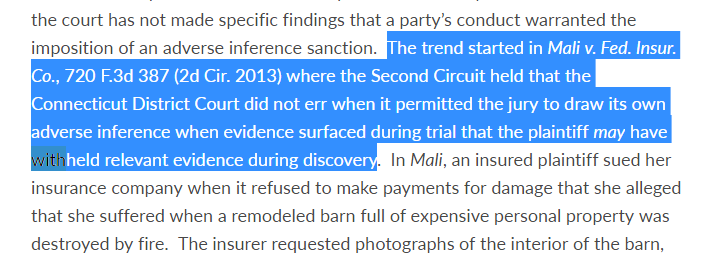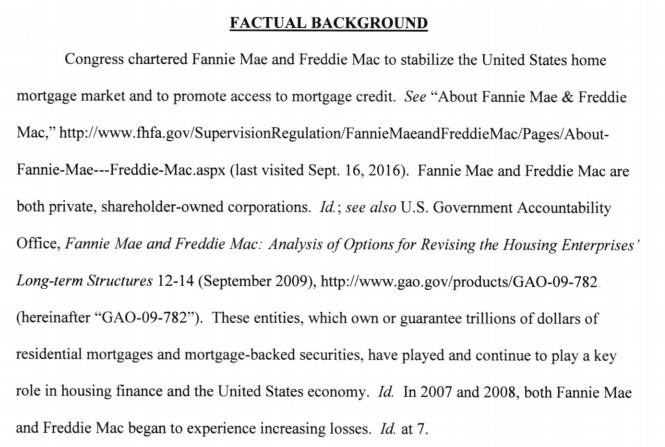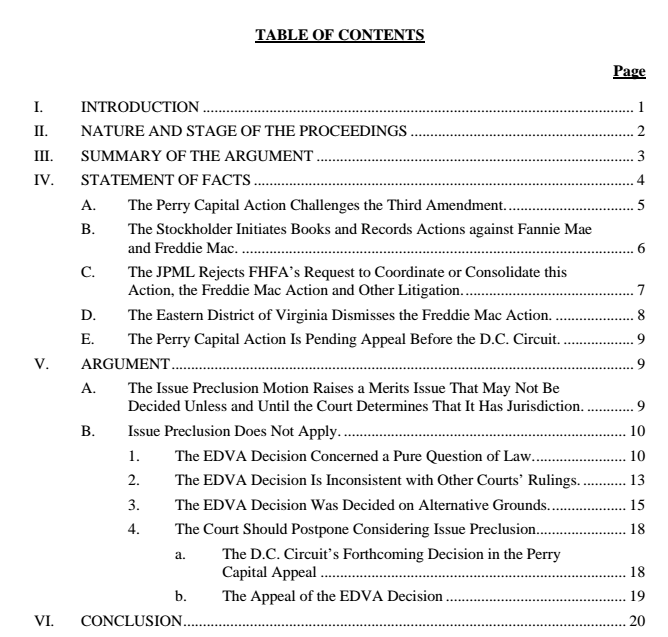Sunday, September 25, 2016 6:19:03 PM
Sep. 25, 2016 6:02 PM ET| Glen Bradford ..

..... Summary .....
-- Judge Sweeney is giving the government a chance to explain why they shouldn't have to pay plaintiffs after the government's conduct necessitated the motion to compel.
-- I am not a lawyer but it sure looks like good news that the government has to explain why it shouldn't have to pay plaintiffs' legal expenses for their motion.
-- If I'm right, things may get exciting before the next president is sworn in 2017.
Fannie Mae (OTCQB:FNMA) and Freddie Mac (OTCQB:FMCC) are two Fortune 50 companies that the government agency, the Federal Housing Finance Agency, runs as a conservator without fiduciary duties to shareholders. This conservatorship began in 2008. In the beginning of conservatorship, the government had negotiated a deal with a tax collector on behalf of tax payers and $100B+ has been transferred to the tax collector on a net cash basis since 2008, leaving taxpayers penniless in 2018. The net result is Fannie Mae and Freddie Mac are being bled dry as a matter of public policy, not because they are broken business models. The government says that by virtue of the net worth sweep that it gets, the net worth of the companies has a $187B liquidation preference and 79% warrant coverage. AIG's (NYSE:AIG) recapitalization ended up with more dilution than just the warrants.
Investment Thesis: The government appears to be facing sanctions in the Court of Claims. The judge is ordering the government to explain why the court should not require the government to pay plaintiffs' reasonable expenses incurred in making the motion to compel, including attorney's fees. It appears that plaintiffs thought whatever order was filed in Sweeney's Court of Claims was relevant to the Perry Capital Appeal because they sent the court there a sealed letter and put out an email to investors saying:
Earlier this week, we received a favorable ruling from Judge Margaret Sweeney in the U.S. Court of Federal Claims granting our motion to compel the United States to produce dozens of documents that had been withheld due to assertions of deliberative process privilege, bank examiner privilege, and presidential communications privilege. In our Motion to Compel, we asserted that the Government has used "haphazard, inconsistent, and in at least some cases plainly unwarranted" privilege assertions to "shield over eleven thousand responsive documents from discovery."
While the court's Opinion and Order is currently under seal, we anticipate that it will be made public (in part or in whole) in the near future.
In the interim, we have informed the U.S. Court of Appeals for the District of Columbia of Judge Sweeney's ruling so it has the benefit of this additional information while evaluating our appeal in Perry Capital LLC v. Lew.
If you recall, the bulk of the Perry Capital Appeal Oral Arguments from Judge Ginsburg's perspective seemed to be the production of a complete administrative record, something that did not happen in the lower court. Instead, Lamberth ruled that no administrative record was relevant, and Robinson seconded Lamberth, saying to the effect that FHFA has no fiduciary duties to shareholders and could treat the GSEs as ATM machines because the powers are permissive, not mandatory. Both companies combined produce $15B/annum at their current level of guarantee fees (G-fees). Their common stock used to trade over $50; stock valuations on a simple warrant dilution basis at current g-fee levels are around $20. I own the preferreds primarily because of how AIG played out. Instead of simply the warrants being dilutive (79%), there was even more dilution to the interests of common shareholders.
What is a sanction ?
I found a great explanation from Ohio Legal Services. I've bolded the money line:
A court can sanction or punish a party who opposes a motion to compel without having substantial justification. Under Civil Rule 37, the court is allowed to order that party to pay the other party's attorney fees that were used to file and present the motion. On the other hand, if the court denies the motion, it can order the party who filed the motion to compel to pay the attorney fees of the party who successfully opposed it.
Once a court grants a motion to compel, the party must obey the order. If a party refuses to obey the order, the court may sanction the refusing party by:
1. ruling that certain facts in the case will be viewed in favor of the requesting party and against the refusing party;
2. preventing the refusing party from supporting or opposing certain claims or defenses in the case;
3. entering judgment against the refusing party; and
4. holding the refusing party in civil contempt. Through a contempt ruling, a court can order a party in jail until that party obeys the court's order.
In short, a court's discovery rules must be respected. Parties should produce relevant documents and answer questions that the other party asks, unless they are confident that they have substantial justification for refusing to do so.
It begs the question, did the government have substantial justification for refusing to produce a majority of the 11,000+ documents hotly disputed in the Court of Claims? Based on the ruling, probably not. Based on my cash flow analysis and the documents released so far, I would argue as close to definitely not as you can get, noting that I haven't seen the documents. The cash flow and the publicly released documents so far don't leave much to the imagination as far as connecting the dots goes. On google, I found a relevant book called, Sanctions: The Federal Law of Litigation Abuse:

Apparently, the trend started in Mali. v. Fed. Insur. where the court permitted the jury to draw its own adverse inference when relevant evidence surfaced during trial that was withheld during discovery.

The Implications of A Sanction ? Adverse Inference
Rule 37(a)(5)(A) reads:
If the Motion Is Granted (or Disclosure or Discovery Is Provided After Filing). If the motion is granted-or if the disclosure or requested discovery is provided after the motion was filed-the court must, after giving an opportunity to be heard, require the party or deponent whose conduct necessitated the motion, the party or attorney advising that conduct, or both to pay the movant's reasonable expenses incurred in making the motion, including attorney's fees. But the court must not order this payment if:
(I) the movant filed the motion before attempting in good faith to obtain the disclosure or discovery without court action;
(II) the opposing party's nondisclosure, response, or objection was substantially justified; or
(III) other circumstances make an award of expenses unjust.
In this case, it is doubtful that applies because plaintiffs attempted in good faith. Secondly, it is doubtful that (II) applies because Sweeney's order puts the burden of proof on the government. Lastly, probably isn't going to apply but Sweeney is giving the opportunity for the government to explain itself.
In February of 2014, the court ordered discovery:

In April of this year, the court began releasing documents to the public and pointed out that the court will not condone the misuse of a protective order:

Rule 37 (B)(2) "Sanctions Sought in the District Where the Action Is Pending" outlines the penalty for not obeying a discovery order. I've bolded the most interesting part:
(A) For Not Obeying a Discovery Order. If a party or a party's officer, director, or managing agent-or a witness designated under Rule 30(6) or 31(4)-fails to obey an order to provide or permit discovery, including an order under Rule 26(f), 35, or 37, the court where the action is pending may issue further just orders. They may include the following:
directing that the matters embraced in the order or other designated facts be taken as established for purposes of the action, as the prevailing party claims;
(ii) prohibiting the disobedient party from supporting or opposing designated claims or defenses, or from introducing designated matters in evidence;
striking pleadings in whole or in part;
(iv) staying further proceedings until the order is obeyed;
(v) dismissing the action or proceeding in whole or in part;
(vi) rendering a default judgment against the disobedient party; or
(vii) treating as contempt of court the failure to obey any order except an order to submit to a physical or mental examination.
For Not Producing a Person for Examination. If a party fails to comply with an order under Rule 35 requiring it to produce another person for examination, the court may issue any of the orders listed in Rule 37(2)-(vi), unless the disobedient party shows that it cannot produce the other person.
(C) Payment of Expenses. Instead of or in addition to the orders above, the court must order the disobedient party, the attorney advising that party, or both to pay the reasonable expenses, including attorney's fees, caused by the failure, unless the failure was substantially justified or other circumstances make an award of expenses unjust.
Asserting a pyramid of privilege to impede the discovery process was just one of the steps the government took to slow everything down as much as possible. Basically, the government was dragged kicking and screaming through the process and it seems that now their non-compliance with document production by means of asserting privilege over thousands of documents is finally coming home to roost.
According to my interpretation of the Adverse Inference Instruction as outlined in Fordham Law Review, federal rules seem to suggest the judge now has the right to create adverse inferences against the government. That's what you get for making plaintiffs go years out of their way to get discovery that you should have handed over, but instead decided instead to sandbag the process by asserting a pyramid scheme of privilege assertions over like a secret gospel that no one should ever have access to even though what you are doing is illegal. That's where we are. That's the ballgame so to speak. It's like the bottom of the 8th inning and the game has been boring so far and so everyone is asleep and no one has been paying attention.
Up until now, the government has been getting the benefit of the doubt in all cases. Judge Sweeney's order likely put an end to this nonsense and the Perry Capital Appeal probably isn't far behind. Judge Ginsburg's intense focus on the administrative record implies that the facts matter which implies that his interpretation of the statute with respect to powers of conservator is different from lower court Judge Lamberth's opinion. No one knows when that order is coming, but we're all waiting for it to come save the day. The skepticism is palpable, but even the biggest critics are forecasting a remand.
The Perry Capital Appeal doesn't really take into consideration the accounting fraud, but Robinson did and Robinson dismissed and was noticed to the Perry Capital Appeal. I see this as a good thing because it exposes the no limits nature of Lamberth's ruling, and if there are no limits, then there are a lot more words in the governing law than necessary.
Soloway v. United States - Non-Shareholder Lawsuit
As I've been saying all along, Fannie Mae and Freddie Mac are private shareholder owned companies. This is precisely what the Department of Justice is arguing:

Further, the point of whether or not the FHFA is the United States came up during the Perry Capital Appeal. In this case, they argue that FHFA is not the United States when it acts as a conservator:

That's in line with the Perry Capital plaintiffs' arguments.
Bruce Berkowitz Banks On Fannie Mae
Bruce Berkowitz gave CNBC a 30-minute interview. If you want the full 30 minutes and don't mind just having audio, the podcast is at the top of this link.
Just show the documents, we will quickly find out who's right or wrong and we can move on.
He also said that Fannie and Freddie should honor contracts. He's a preferred stockholder. If you're interested in a clip specifically relating to owning preferred stock, Bruce discusses that here. He argues that they should be treated like a utility that makes a reasonable but not excessive return and that they shouldn't be used for political purpose.
When you look at the companies they are the lowest cost producer. They had the best results during the crisis. They helped more people. They were the only two companies that kept working during the crisis and lost money on purpose so that the mortgage markets can continue to run. This can be resolved very simply and very quickly. We are just asking for exactly what happened to AIG.
A restatement of the financials and its implications thanks to the accounting fraud lawsuits wouldn't be bad either and might force the government to recapitalize the companies at their own expense.
Edwards V. Deloitte
It looks like Judge Scola denied FHFA's motion:
PAPERLESS ORDER: On September 1, 2016, the Court granted the Plaintiffs leave to file a surreply in order to address a case cited by the Federal Housing Finance Agency in 34 its response in its response in support to 15 its motion to substitute as plaintiff. The Court only granted the motion because the case, Pagliara v. Federal Home Mortgage Corporation, 2016 WL 4441978 (E.D. Va. Aug. 23, 2016), was decided after the Plaintiffs had filed 20 their response in opposition. The Federal Housing Finance Agency now 39 moves for leave to file a reply to 38 the Plaintiffs' surreply because the Plaintiffs "mischaracterize[] the Pagliara decision." The Court denies 39 the motion. The Federal Housing Finance Agency and the Plaintiffs have now had the opportunity to address the Pagliara case. The Court is capable of reading the parties' arguments and interpreting the case without any further briefing. Signed by Judge Robert N. Scola, Jr. on 9/23/2016. (KBR) (Entered: 09/23/2016)
Judge Scola doesn't want to hear anything more about Judge Cacheris' decision denying Mr. Pagliara access to Freddie Mac's books and records.
Pagliara Filed His Appeal + Reply Against Motion To Substitute
Pagliara vs. Freddie Mac was officially appealed. More importantly, it looks like Pagliara wants the court to postpone until Perry Capital Appeal is rendered. Score:

Also, if you're interested in the MDL oral arguments, these were filed here. Hopefully, this rules after the Perry Capital Appeal.
Summary and Conclusion
The government has been ordered to produce documents for discovery by Judge Sweeney and perhaps the government will get the bill for unnecessarily delaying the judicial process. This has been noticed to Perry Capital Appeal's Court and rulings there could come any Tuesday/Friday between 10-11 am EST.
It would appear that Judge Sweeney's patience has worn thin. As for me, I've done the math and I think I can hold my current quantity of shares for another 2 months before I run out of money and am forced to start selling. Hopefully, by then I'm proven right. If not, I may get the opportunity to make changes to what I own. I am not sure what I'm going to do yet because I'm not there yet but we'll be there soon enough and it's always good to be prepared. Unfortunately, it looks like Judge Sweeney's news is going to prevent me from being able to buy more shares at a cheaper valuation. As such, I may need to revisit what's more important, my credit having at least one month of default or my net worth. It's a tough call but given where I am right now, I'm choosing my credit rating. Maybe I'm a wimp for doing so, I wish I knew how to figure that one out. I have 27,225 FNMFN, 500 FMCKO, 6,585 FMCKP, 9,714 FMCCT, 4,050 FMCCH, 2,600 FMCKI, 9,340 FMCCP and 5 FNFMO. Along the way, I've missed a ton of opportunity to do all sorts of things, but that's just how it is sometimes.
Avant Technologies Equipping AI-Managed Data Center with High Performance Computing Systems • AVAI • May 10, 2024 8:00 AM
VAYK Discloses Strategic Conversation on Potential Acquisition of $4 Million Home Service Business • VAYK • May 9, 2024 9:00 AM
Bantec's Howco Awarded $4.19 Million Dollar U.S. Department of Defense Contract • BANT • May 8, 2024 10:00 AM
Element79 Gold Corp Successfully Closes Maverick Springs Option Agreement • ELEM • May 8, 2024 9:05 AM
Kona Gold Beverages, Inc. Achieves April Revenues Exceeding $586,000 • KGKG • May 8, 2024 8:30 AM
Epazz plans to spin off Galaxy Batteries Inc. • EPAZ • May 8, 2024 7:05 AM









